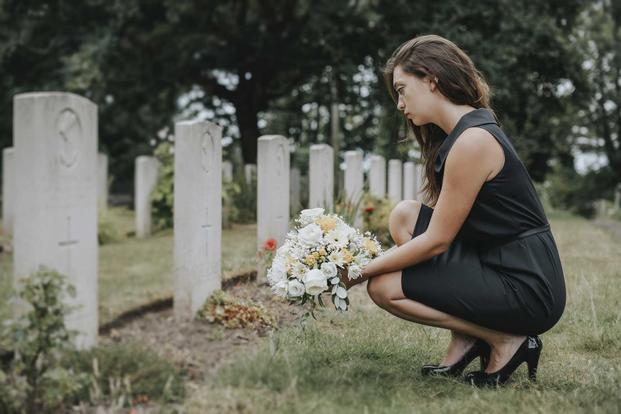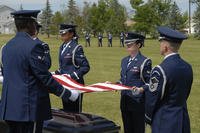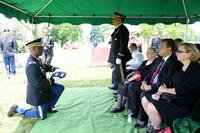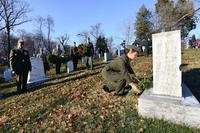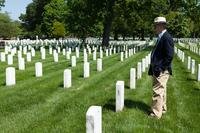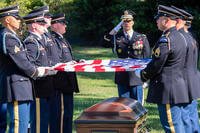Any veteran without a dishonorable discharge is eligible for free burial in one of 155 national cemeteries in 42 states and Puerto Rico. Their spouses and some dependent children may also be eligible.
Most states also have dedicated veterans cemeteries, and many offer burial of spouses for free or a reduced fee.
Who Is Eligible for Free Burial in a National Cemetery?
Active-Duty Members
- Any member of the U.S. Armed Forces who dies on active duty.
- Any veteran who was discharged under conditions other than dishonorable and served at least 24 months of service.
- Any U.S. citizen who served with U.S. allied forces during any war in which the United States takes place.
Reserve Components and Reserve Officers' Training Corps
- Reservists and National Guard members who, at time of death, were entitled to retired pay under Chapter 1223, Title 10, United States Code, or would have been entitled when they reached retirement age.
- Reserve or National Guard members who die while hospitalized or undergoing treatment for injuries or illnesses incurred during honorable service.
- Members of the ROTC who die while attending authorized training or while performing authorized travel to or from that training.
National Oceanic and Atmospheric Administration
- A commissioned officer of the National Oceanic and Atmospheric Administration.
Public Health Service
- A commissioned officer of the Commissioned Corps of the Public Health Service who served on full-time duty on or after July 29, 1945.
World War II Merchant Mariners
- United States Merchant Mariners with oceangoing service during the period of armed conflict, Dec. 7, 1941, to Dec. 31, 1946.
Philippine Armed Forces
- Any Philippine veteran with service between Oct. 6, 1945, and June 30, 1947, who died on or after Dec. 16, 2003, and was a citizen of the United States or a legal alien living in the U.S. when they died.
Spouses and Dependents
- The spouse or surviving spouse of an eligible veteran is eligible for interment in a national cemetery even if that veteran is not buried or memorialized in a national cemetery. In addition, the spouse or surviving spouse of a member of the Armed Forces of the United States whose remains are unavailable for burial is also eligible for burial.
- The surviving spouse of an eligible veteran who remarried a non-veteran is eligible for burial in a national cemetery, based on their marriage to an eligible veteran.
- The minor children of an eligible veteran.
- The unmarried adult child of a veteran if they are incapable of self-support.
Parents
- Biological or adoptive parents, who died after Oct. 13, 2010, and whose biological or adoptive child was a service member whose death occurred on or after Oct. 7, 2001, and
- whose death was the result of a hostile casualty or a training-related injury, and
- who is interred in a national cemetery, in a gravesite with available space for subsequent interment, and
- at the time of the parent’s death, had no spouse, surviving spouse, or child who is buried, or who, upon death, may be eligible for burial in a national cemetery.
Persons NOT Eligible for Burial in a VA National Cemetery
The following is a list of persons who are not eligible for VA burial benefits:
- Former spouses. A former spouse of an eligible individual whose marriage to that individual has been terminated by annulment or divorce, if not otherwise eligible.
- Other family members. Family members of an eligible person except those defined as eligible above.
- Received an urn or plaque. When a family member accepts a VA-issued commemorative urn or plaque, that veteran's remains may not be interred in a VA national cemetery.
- Disqualifying characters of discharge. A person whose only separation from the Armed Forces was under dishonorable conditions or whose character of service results in a bar to veterans benefits.
- Discharge from draft. A person who was ordered to report to an induction station but was not actually inducted into military service.
- Person found guilty of a capital crime. A person convicted of a federal or state capital crime and sentenced to death or life imprisonment.
- Persons convicted of certain sex offenses. Those convicted of a Tier III sex offense and sentenced to a minimum of life imprisonment. This prohibition also applies to Presidential Memorial Certificate, burial flag, and headstone and marker benefits.
- Subversive activities. Any person convicted of subversive activities after Sep. 1, 1959, shall have no right to burial in a national cemetery.
- Active or inactive duty for training. A person whose only service is active duty for training or inactive duty training in the National Guard or a reserve component, unless the individual meets the eligibility criteria listed above.
Stay on Top of Your Veteran Benefits
Military benefits are always changing. Keep up with everything from pay to health care by subscribing to Military.com, and get access to up-to-date pay charts and more with all latest benefits delivered straight to your inbox.
